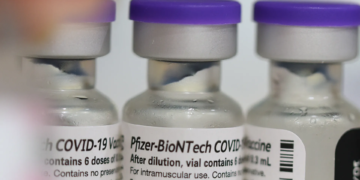A tall fibreglass tank is under lock and key on Matt Culley’s arable farm in Hampshire. No wonder: the fertiliser contained inside has become an increasingly precious commodity.
The cost of synthetic fertiliser, necessary for growing many crops and grass, began to climb last autumn when the price of gas required to produce it began to rise steeply. The conflict in Ukraine has only exacerbated the situation.
If Culley were to buy enough fertiliser to fill just this 25,000-litre vessel at current prices, it would cost him £21,000. Just a year ago, the same quantity of liquid urea-ammonium nitrate would have set him back £6,000 – a 350% increase.
“We aren’t the most fertile land here,” said Culley, buffeted by a spring downpour as he surveys a field of milling wheat, which will be turned into flour to be used in biscuits.

Planted in late October, the wheat’s green shoots have already grown to a height of around 15cm (six inches) centimetres, and all being well, the crop will be ready for harvest by mid-August.
“We are conventional farmers so we rely on inputs, whether synthetic or organic like manure, to feed the crop to the point where we can justify doing the job.”
British farmers use around 1m tonnes of manufactured nitrogen each year, to grow crops for human consumption, and grass for animals to eat, according to Anthony Hopkins, chief crops adviser at the National Farmers’ Union (NFU).
Yet farmers are facing unprecedented costs for this vital ingredient. Quotes for ammonium nitrate fertiliser prices have risen as high as £1,000 a tonne in recent weeks, compared with £280 a tonne 12 months ago.
Culley and his brother Daniel are the fourth generation to farm these 170 hectares (420 acres) of land near the town of Andover – growing wheat, barley, oilseed rape and soft fruit – while he also manages an additional 480 hectares for other local farmers and landowners.
Some but not all of the fertiliser required for this year’s crop had been bought by Culley last autumn when the price began to rise, and so he decided to hold off future purchases; a decision he now regrets. Multi-year contracts for some of his crops mean he is committed to delivering a set amount of product at harvest time.
As a result, he and the arable farmers he represents as chairman of the NFU’s crops board are offsetting the increased cost by making do with less.
“This year we are cutting back application by 25% on all crops within our buying group. It saves ordering an extra load,” Culley said. “We have to apply enough to grow the crops, but we’ll have to lower our expectations in terms of yield.”
Fertiliser is just one of the three Fs which farmers have to buy – along with feed and fuel – all of which have soared in price over recent months, especially since Russia invaded Ukraine, adding to the squeeze on agriculture.
Culley has recorded a 60% increase in animal feed over the past two years, while energy and lubricants are more than a third (38%) higher, and fungicides and herbicides have climbed by about 10%.
Rocketing costs present just the latest challenge for domestic food producers, following months of worker shortages, which were highlighted last week in a parliamentary report.
MPs on the environment, food and rural affairs committee warned that chronic worker shortages could hit domestic production, leading to even higher food prices, and more food imports.
Ongoing and sizeable labour shortages have caused unharvested crops to be left to rot in fields, prompted the killing of healthy pigs on farms because of a lack of workers at meat processing plants, and disrupted the food supply chain, threatening the UK’s food security.
The UK produces enough food to cover about 60% of its needs, however many in agriculture fear a persistent lack of workers following Covid and Brexit – while seasonal worker permits for people coming to the UK to pick crops and flowers are limited to 30,000 a year by government – combined with soaring costs are putting so much pressure on farmers that some may choose to leave the industry.
Minette Batters, president of the NFU, is calling on the government to help farmers mitigate some of the unprecedented costs and tightening supplies of fertiliser.
She welcomed the fertiliser crisis meeting hosted by the Department for the Environment, Food and Rural Affairs (Defra) with agriculture industry bodies, including the NFU, at the end of March.
Ministers have delayed the introduction of a ban on the use of urea, a key fertiliser used in the UK, to reduce air pollution – and are also changing some rules around autumn muck spreading.
“We are continuing to engage with government on the importance of fertiliser and about ways it can ensure stability and confidence in the food supply chain,” Batters said.
However, some of the government’s other measures are more long term, and unlikely to have an immediate impact. Defra has offered to pay farmers to lessen the cost of sowing nitrogen-fixing plants, such as legumes and clovers, which don’t require fertiliser. But this isn’t much help when crops such as Culley’s winter wheat are already in the ground.
Commodity analysts are warning that farmers won’t see fertiliser prices come down any time soon.
The consultancy CRU Group, which tracks commodity prices, saw its fertiliser price index – which includes data for nitrogen, potash and phosphate – reach a record high on 31 March, following the start of the war in Ukraine.
“At the moment we expect prices to continue to increase over the next couple of months,” said Chris Lawson, head of fertilisers at CRU. “There is incredible volatility in the market right now.”
Several factors will keep prices elevated for longer, including high gas prices and reduction in supply. Last month, CRU estimated that energy costs were impacting almost a third (28%) of European fertiliser capacity, as plants reduced production or were temporarily suspended.
The UK produces about 40% of its own fertiliser, yet there are also some concerns over deliveries from Russia – the world’s biggest exporter of synthetic fertiliser, which supplies more than a fifth of urea –which has restricted some exports.
Sign up to the daily Business Today email or follow Guardian Business on Twitter at @BusinessDesk
Back on the farm in Hampshire, Culley will keep monitoring his fields over the coming weeks, working out how often to apply small amounts of fertiliser, to ensure his crops are growing as required.
“The risk is much higher at these prices,” he said. “The question next autumn will be, do we plant this crop?”
A Lancashire farmer spoke for many in his industry when he recently won £30,000 on the People’s Postcode Lottery. Rather than splashing out on a new car, or a holiday, he announced he would spend all of his windfall on fertiliser.








:quality(70)/cloudfront-eu-central-1.images.arcpublishing.com/irishtimes/CGYPT6WE7VAO3KJ773SHUVMVBY.jpg?resize=1200,630&ssl=1)



